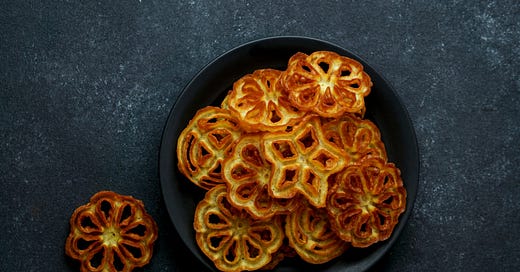I have launched a restaurant review site called How to Eat L.A. Please check it out! -Katherine
If you haven’t become a paid Smart Mouth subscriber yet, please consider it. The money goes straight to paying freelancers a good rate - much better than most publications. And if not that, click on the heart icon above so I know you’re reading! Please enjoy the article below by Aishwarya Jagani.
From Norway to Kerala: The Christmas Cookie That’s Not Really a Cookie
By Aishwarya Jagani
Snacking is an integral part of Kerala’s social dynamic and the strong community-based culture of the southern Indian coastal state.
Stopping in unannounced to a neighbor's house for a late afternoon cup of coffee is common, and homes in Kerala tend to always have crunchy, deep-fried snacks on hand to offer visitors - from the wildly popular raw banana chips, to the lesser-known pappada vada (pappadams coated in a second layer of rice flour batter and deep fried). But no other snack evokes a sense of warm nostalgia, of unwrapping Christmas presents and helping aunts, mothers, and grandmothers prepare mouth watering festive feasts, like rose cookies.
Looking like crunchy, golden-brown flowers on a plate, rose cookies, or achappam as they are locally known, are a familiar sight in Kerala at weddings, Christmas, Easter, Onam, and Diwali.
Rose cookies aren’t really cookies: they’re fritters made of a flour and milk batter. A flower-shaped iron mold is dipped into the batter, and then immersed in hot oil until the lacy cookies slide off and turn golden brown in the hot oil. They are often seasoned with fennel, sesame or cumin seeds, and rose water, and finished by being doused in sweet cinnamon syrup or dusted with powdered sugar.
Believed to be Scandinavian in origin, rose cookies are equally popular at Christmas in Norway and Sweden, where they are called rosettes (or in Norwegian, rosetbakkelser) and can be whimsically shaped like bells, Christmas trees, Santa Claus, bunnies, or elephants. They are also found in other European countries, including Holland and Portugal, from where they made their way to Goa in India.
In India’s smallest state and most famous beach town, Goa (which was colonized by the Portuguese and to this day, retains strong Portuguese influences), they are called rose de coque and are served at Christmas alongside traditional Goan delicacies like dodol (coconut milk and jaggery pudding), neureos (sweet fried dumplings stuffed with desiccated coconut and nuts), and traditional Goan cake, baath.
In Kerala, the cookies probably originated in the kitchens of Syrian Christians in one of the oldest Christian communities in the world. But Kerala or Goa aren’t the only Indian states in which you’ll find versions of rose cookies.
Other versions of rose cookies include Tamil Nadu’s achu murukku and Andhra Pradesh’s gulabi puvullu. The Andhra Pradesh variant is often eggless, and the Tamil and Goan variants may substitute rice flour for all-purpose flour, or use a combination of both.
With so many varieties of the crunchy treat, and so many different local names for it, it is no wonder that rose cookies, rosettes, achappam, or whatever you like to call them, sparked a mini Twitter war last Christmas over what they’re actually called. Twitter user @misandristbb shared a picture of freshly prepared rose cookies, and found herself deluged with messages from Malayalis, the people of Kerala, who insisted they were called achappam, and not rose cookies.
Malayali food writer Kaviya Cherian said of the controversy “The rose cookie is a good example of why it is dangerous to try and pursue the most ‘authentic’ version of any specific cultural food: Every country — and in some cases, region or state — is going to claim its own version as the most authentic one. And they won’t be wrong.”
If you liked the newsletter today, please forward it to someone who’d enjoy it, and tap the heart icon above or below, which will help me reach more readers. I appreciate your help, y’all!
This newsletter is edited by Katherine Spiers, host of the podcast Smart Mouth.
A TableCakes Production.
Want to contribute? Here are the submission guidelines.




